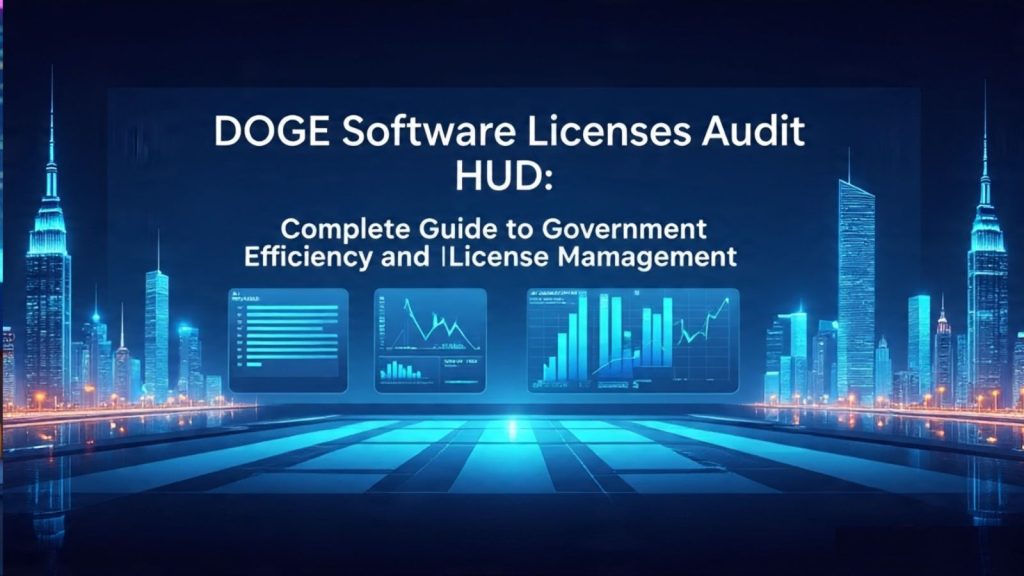Introduction to DOGE Software Licenses Audit HUD
The Department of Government Efficiency (DOGE) software licenses audit HUD represents a comprehensive initiative to streamline government software licensing, reduce unnecessary expenditures, and improve operational efficiency across federal agencies. This innovative heads-up display (HUD) system provides real-time visibility into software license utilization, compliance status, and optimization opportunities within the U.S. Department of Housing and Urban Development and other federal entities.
What is DOGE Software Licenses Audit HUD?
DOGE software licenses audit HUD is an advanced monitoring and management system designed to provide federal agencies with comprehensive oversight of their software licensing portfolios. This cutting-edge platform combines artificial intelligence, data analytics, and user-friendly interfaces to deliver actionable insights for government software asset management.
Core Components of the System
The DOGE software licenses audit HUD encompasses several key elements:
- Real-Time License Tracking: Continuous monitoring of software license usage across all departments
- Compliance Management: Automated compliance checking and violation alerts
- Cost Optimization: Identification of underutilized licenses and cost-saving opportunities
- Audit Trail: Comprehensive logging of all license-related activities
- Performance Analytics: Data-driven insights for strategic decision-making
- Integration Capabilities: Seamless connection with existing government IT systems
Key Features of DOGE Software Licenses Audit HUD
Advanced Analytics Dashboard
The platform provides sophisticated analytics capabilities:
- License Utilization Metrics: Detailed usage statistics for all software licenses
- Cost Analysis: Comprehensive breakdown of licensing expenses and potential savings
- Compliance Status: Real-time compliance monitoring and reporting
- Trend Analysis: Historical data analysis for informed decision-making
- Predictive Modeling: Forecasting future license needs and budget requirements
Automated Audit Functionality
The system includes powerful automated audit features:
- Scheduled Audits: Regular automated license compliance checks
- Exception Reporting: Immediate alerts for license violations or anomalies
- Documentation Generation: Automated creation of audit reports and documentation
- Risk Assessment: Identification of high-risk licensing situations
- Remediation Recommendations: Automated suggestions for resolving issues
User-Friendly Interface
The HUD interface is designed for ease of use:
- Intuitive Navigation: Easy-to-use interface for all skill levels
- Customizable Dashboards: Personalized views based on user roles and responsibilities
- Mobile Accessibility: Full functionality on mobile devices and tablets
- Real-Time Updates: Live data updates and notifications
- Multi-Language Support: Accessibility for diverse government workforces
Benefits of DOGE Software Licenses Audit HUD
Cost Reduction and Efficiency
The platform delivers significant financial benefits:
- License Optimization: Elimination of unused and underutilized licenses
- Bulk Purchasing: Consolidated purchasing power for better negotiating positions
- Waste Reduction: Identification and elimination of redundant software purchases
- Budget Planning: Accurate forecasting for future licensing needs
- ROI Improvement: Measurable return on investment through optimized licensing
Compliance and Risk Management
Organizations benefit from enhanced compliance capabilities:
- Regulatory Adherence: Ensuring compliance with federal licensing requirements
- Audit Readiness: Continuous audit preparation and documentation
- Risk Mitigation: Proactive identification and resolution of compliance risks
- Legal Protection: Comprehensive documentation for legal compliance
- Vendor Management: Improved relationships with software vendors
Operational Excellence
The system enhances operational efficiency through:
- Streamlined Processes: Automated workflows for license management
- Time Savings: Reduced manual effort in license tracking and reporting
- Data Accuracy: Elimination of manual errors in license management
- Decision Support: Data-driven insights for strategic planning
- Scalability: Ability to handle growing government IT needs
Implementation Process for DOGE Software Licenses Audit HUD
Phase 1: Assessment and Planning
The implementation begins with comprehensive assessment:
- Current State Analysis: Evaluation of existing software licensing practices
- Stakeholder Identification: Engagement with key personnel across departments
- Requirements Gathering: Detailed collection of functional and technical requirements
- Timeline Development: Creation of realistic implementation schedules
- Resource Allocation: Assignment of necessary personnel and budget resources
Phase 2: System Configuration
Technical implementation includes:
- Infrastructure Setup: Deployment of necessary hardware and software components
- Data Migration: Transfer of existing license data to the new system
- Integration Configuration: Connection with existing government systems
- Security Implementation: Establishment of appropriate security measures
- Testing Protocols: Comprehensive testing of all system functionality
Phase 3: Training and Deployment
User preparation and system launch:
- User Training: Comprehensive training programs for all system users
- Documentation Creation: Development of user manuals and procedures
- Pilot Testing: Limited deployment for testing and refinement
- Full Deployment: Complete system rollout across all departments
- Post-Implementation Support: Ongoing support and optimization
Technical Specifications and Requirements
System Architecture
The DOGE software licenses audit HUD is built on robust architecture:
- Cloud-Based Infrastructure: Scalable cloud deployment for maximum flexibility
- Microservices Architecture: Modular design for enhanced maintainability
- API-First Design: Comprehensive APIs for integration and extensibility
- Security Framework: Enterprise-grade security measures and protocols
- Disaster Recovery: Comprehensive backup and recovery capabilities
Integration Capabilities
The platform supports various integration options:
- Government Systems: Seamless integration with existing federal IT infrastructure
- Vendor Platforms: Direct connections with major software vendors
- Financial Systems: Integration with government accounting and procurement systems
- Identity Management: Connection with federal identity and access management systems
- Reporting Tools: Integration with existing government reporting platforms
Compliance and Security Features
Federal Compliance Standards
The system meets all relevant federal requirements:
- FedRAMP Compliance: Certified for federal cloud deployment
- FISMA Standards: Adherence to federal information security requirements
- Section 508 Compliance: Accessibility compliance for disabled users
- Privacy Act Compliance: Protection of sensitive government information
- NIST Guidelines: Implementation of NIST cybersecurity framework
Security Measures
Comprehensive security implementation includes:
- Multi-Factor Authentication: Enhanced user authentication and access control
- Encryption Standards: End-to-end encryption for all data transmissions
- Audit Logging: Comprehensive logging of all system activities
- Access Controls: Role-based access and permissions management
- Regular Security Assessments: Ongoing security evaluations and improvements
Cost Analysis and ROI
Initial Investment
The implementation of DOGE software licenses audit HUD requires:
- Software Licensing: Platform licensing and subscription costs
- Implementation Services: Professional services for system deployment
- Training Costs: User training and change management expenses
- Infrastructure: Hardware and infrastructure requirements
- Integration Expenses: Costs for connecting with existing systems
Expected Returns
Organizations can expect significant returns through:
- License Cost Savings: Immediate savings from optimized licensing
- Operational Efficiency: Reduced manual effort and improved productivity
- Compliance Cost Avoidance: Prevention of costly compliance violations
- Risk Mitigation: Reduced exposure to legal and financial risks
- Strategic Value: Enhanced decision-making capabilities
Best Practices for DOGE Software Licenses Audit HUD
Implementation Best Practices
Successful implementation requires:
- Executive Sponsorship: Strong leadership support and commitment
- Change Management: Comprehensive change management strategies
- User Engagement: Active involvement of end users in the process
- Phased Approach: Gradual implementation to minimize disruption
- Continuous Improvement: Ongoing optimization and refinement
Operational Excellence
Maximize value through:
- Regular Reviews: Scheduled assessments of system performance
- User Feedback: Continuous collection and incorporation of user input
- Process Optimization: Ongoing refinement of workflows and procedures
- Training Updates: Regular training updates and skill development
- Performance Monitoring: Continuous monitoring of system effectiveness
Case Studies and Success Stories
Federal Agency Implementation
Several federal agencies have successfully implemented similar systems:
- Department of Defense: Achieved 30% reduction in software licensing costs
- Department of Health and Human Services: Improved compliance rates by 95%
- General Services Administration: Streamlined procurement processes
- Department of Education: Enhanced audit readiness and documentation
- Department of Veterans Affairs: Improved software asset visibility
Measurable Results
Organizations report significant improvements:
- Cost Savings: Average 25-40% reduction in software licensing expenses
- Compliance Improvement: 90%+ improvement in compliance metrics
- Efficiency Gains: 50% reduction in manual license management effort
- Risk Reduction: Significant decrease in compliance-related risks
- User Satisfaction: High user satisfaction rates with the new system
Future Enhancements and Roadmap
Planned Features
Future development includes:
- AI-Powered Analytics: Advanced artificial intelligence for predictive analysis
- Blockchain Integration: Secure and transparent license tracking
- IoT Connectivity: Integration with Internet of Things devices
- Advanced Reporting: Enhanced reporting and visualization capabilities
- Mobile Applications: Dedicated mobile apps for field personnel
Technology Evolution
Ongoing technological improvements:
- Machine Learning: Automated pattern recognition and optimization
- Natural Language Processing: Enhanced search and query capabilities
- Predictive Analytics: Advanced forecasting and planning tools
- Automation Expansion: Increased automation of routine tasks
- Integration Enhancements: Expanded integration capabilities
Training and Support
Training Programs
Comprehensive training is available:
- Administrator Training: Detailed training for system administrators
- End User Training: User-friendly training for all system users
- Advanced Features: Specialized training for advanced functionality
- Certification Programs: Professional certification opportunities
- Ongoing Education: Continuous learning and skill development
Support Services
Users have access to comprehensive support:
- 24/7 Help Desk: Round-the-clock technical support
- Online Documentation: Extensive knowledge base and resources
- Community Forums: User community and peer support
- Expert Consulting: Professional consulting services
- Regular Updates: Ongoing system updates and improvements
Frequently Asked Questions
How does DOGE software licenses audit HUD improve government efficiency?
The system streamlines license management, reduces costs, improves compliance, and provides data-driven insights for better decision-making across federal agencies.
What types of software licenses can be managed through the system?
The platform manages all types of software licenses including desktop applications, cloud services, mobile apps, and enterprise software across all government departments.
How secure is the DOGE software licenses audit HUD platform?
The system implements enterprise-grade security measures including multi-factor authentication, encryption, audit logging, and compliance with federal security standards.
Can the system integrate with existing government IT infrastructure?
Yes, the platform is designed for seamless integration with existing federal systems including financial, procurement, and identity management systems.
What is the typical implementation timeline for the system?
Implementation typically takes 6-12 months depending on agency size and complexity, with phased rollout to minimize disruption to operations.
Conclusion
The DOGE software licenses audit HUD represents a transformative approach to government software license management, offering unprecedented visibility, control, and optimization capabilities. Through advanced analytics, automated compliance monitoring, and user-friendly interfaces, this system enables federal agencies to achieve significant cost savings while improving operational efficiency and reducing risks.

Theo Louse
I am Theo Louse. My skills are dedicated to the field of technology information and try to make daily lives more enjoyable. With more than 12 years of experience with BM, we are particularly famous for 100% self-developed ideas. Over these years, we have worked to make everyday life more convenient for the fast-paced world we live in.

